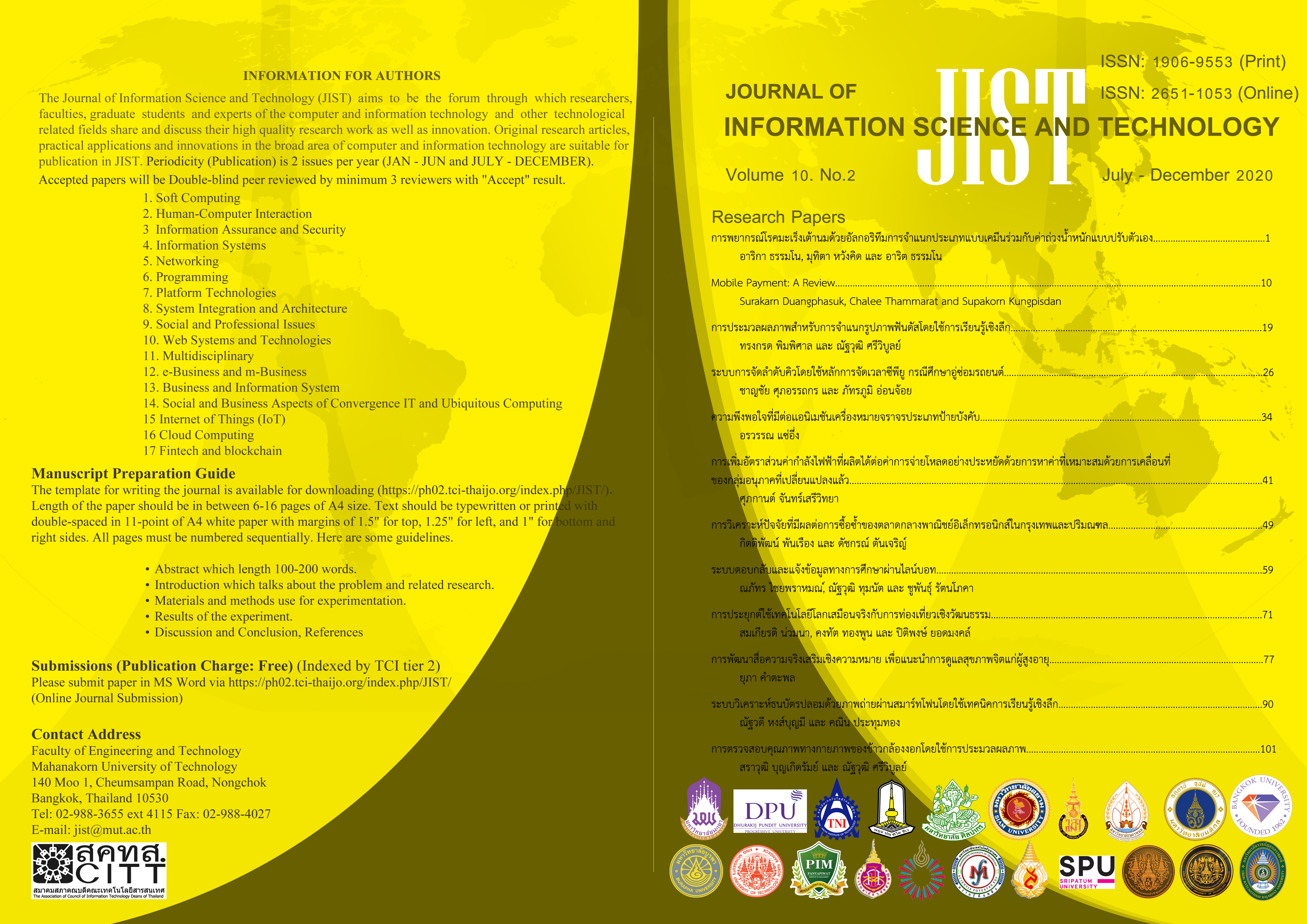The Development of Semantic Augmented Reality Media for Recommending the Mental Health Care for Elderly
Main Article Content
Abstract
The research aims 1) to study the pattern of semantic knowledge base for recommending the metal health care for elderly 2) to develop the semantic augmented reality media (S-AR) for recommending the metal health care for elderly and 3) to assess the performance of SARM. Gathering the knowledge from books and in depth interviewing with 30 psychiatrists who have experience in metal health care for elderly and use the questionnaire with 70 elderly for creating the S-AR in web application on web application and access the performance and user satisfaction to the S-AR. This research found that semantic knowledge base divided 3 layers for linking to 2D AR which covered contents following the happiness 5 dimensions concept. The performance of S-AR was F-measure = 88.9% and user’s satisfaction to system in overview was high level ( x̄= 4.24, SD=0.599)
Article Details
This work is licensed under a Creative Commons Attribution-NonCommercial-NoDerivatives 4.0 International License.
I/we certify that I/we have participated sufficiently in the intellectual content, conception and design of this work or the analysis and interpretation of the data (when applicable), as well as the writing of the manuscript, to take public responsibility for it and have agreed to have my/our name listed as a contributor. I/we believe the manuscript represents valid work. Neither this manuscript nor one with substantially similar content under my/our authorship has been published or is being considered for publication elsewhere, except as described in the covering letter. I/we certify that all the data collected during the study is presented in this manuscript and no data from the study has been or will be published separately. I/we attest that, if requested by the editors, I/we will provide the data/information or will cooperate fully in obtaining and providing the data/information on which the manuscript is based, for examination by the editors or their assignees. Financial interests, direct or indirect, that exist or may be perceived to exist for individual contributors in connection with the content of this paper have been disclosed in the cover letter. Sources of outside support of the project are named in the cover letter.
I/We hereby transfer(s), assign(s), or otherwise convey(s) all copyright ownership, including any and all rights incidental thereto, exclusively to the Journal, in the event that such work is published by the Journal. The Journal shall own the work, including 1) copyright; 2) the right to grant permission to republish the article in whole or in part, with or without fee; 3) the right to produce preprints or reprints and translate into languages other than English for sale or free distribution; and 4) the right to republish the work in a collection of articles in any other mechanical or electronic format.
We give the rights to the corresponding author to make necessary changes as per the request of the journal, do the rest of the correspondence on our behalf and he/she will act as the guarantor for the manuscript on our behalf.
All persons who have made substantial contributions to the work reported in the manuscript, but who are not contributors, are named in the Acknowledgment and have given me/us their written permission to be named. If I/we do not include an Acknowledgment that means I/we have not received substantial contributions from non-contributors and no contributor has been omitted.
References
Department of Mental Health, Promote mental health of the elderly, Nonthaburi: Department of Mental Health, 2019.
G. Antoniou, E. Franconi and F.V Harmelen, “Introduction to Semantic Web Ontology Languages,” In Proc. Lecture Notes in Computer Science, January, pp. 1-21, 2005.
J. Pakorn, “AR (Augmented Reality) technology, the virtual world merges the real world,” February, 2018. [Online], Available: https://www.scimath.org/article-technology/item/7755-ar-augmented-reality. [Accessed Aug. 10, 2019].
H. Kim, T. Matuszka, J. Kim1, J. Kim, W. Woo, “Ontology-based mobile augmented reality in culturalheritage sites: information modeling and user study,” Multimedia Tools and Applications, Vol. 76, no 24, pp. 26001–26029, 2017.
J. Dechicchis, “Semantic Understanding for Augmented Reality and ItsApplications,” M. S. thesis, Duke University, Durham, North Carolina, 2020.
L. Djordjevic, N. Petrovic and M. Tosic, “An Ontology-based Framework for AutomatedCode Generation of web AR Applications,” Telfor Journal, Vol. 12, no 1, pp. 67-72, 2020.
Ministry of Mental Health, Office of Mental Health and Development, Standards for Mental Health Promotion and Prevention of Mental Health Problems for Community Hospital / Office of Mental Health Promotion and Development, Department of Mental Health, Ministry of Public Health. Nonthaburi: Department of Mental Health, 2015.
C. D. Manning, P. Raghavan and H. Schütze, “Introduction to Information Retrieval,” Cambridge University Press, London, United Kingdom, 2009.
P. Cimiano, O. Corcho, V. Presutti, L. Hollink and S. Rudolph, “The Semantic Web: Semantics and Big Data,” In Proc. Extended Semantic Web Conference ’10, 2013.
P. Sittichak and W. Sanchana, “Development knowledge management system for mangkla folk music in lower northern area for promote and distribute of thai culture using ontology and semantic wikipedia,” Rajabhat Chiang Mai Research Journal, Vol. 15, no 1, pp. 59-72, 2014.



